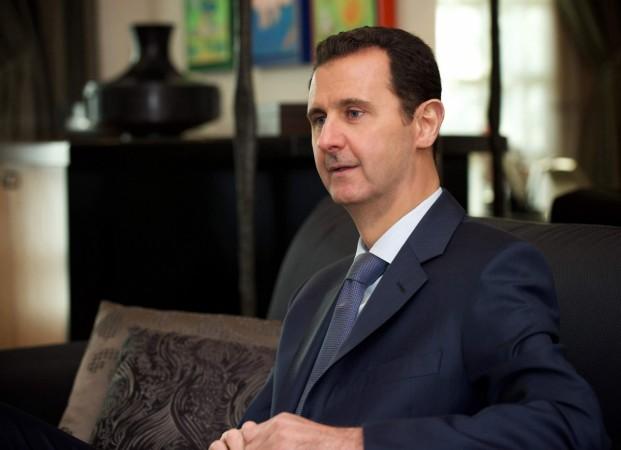
Syrian President Bashar al-Assad has hinted at getting regular updates from the US-led coalition about its war on the Islamic State (ISIS), despite there being no direct communication with the coalition partners.
In an interview with BBC's Middle East editor Jeremy Bowen in Damascus, Assad reveals that although his government has no direct contact with the coalition, third parties, including Iraq, update him on the coalition's efforts to eliminate the hardliner Sunni militant group.
He also dismisses claims by critics of his government that the secluded country's military was randomly dropping barrel bombs on rebel-held areas in Syria, killing thousands of innocent civilians. The bombings are widely considered to be well-documented and founded.
'Conveying Information'
Assad is known to be one of the most controversial figures in contemporary world politics, with many of the US-led coalition states denying any kind of cooperation from the leader, for he is allegedly responsible for the deaths of many of his own countrymen.
He has remained a secluded and isolated leader ever since an uprising against his rule erupted in 2011. He enjoys the support of perhaps few world leaders, such as Russia's Putin.
However, after the deadly jihadist outfit ISIS seized large swathes of land north of Iraq and Syria in their quest to establish a Islamic Caliphate, world leaders didn't rule out the possibility of working with the Syrian leader to fight the group. Assad, however, refuses to cooperate with the international coalition that is positioned well to destroy the jihadist outfit.
Asked about why he refuses to cooperate, he says: "No, definitely, we cannot and we don't have the will and we don't want, for one simple reason – because we cannot be in an alliance with countries which support terrorism," using the term arbitrarily to refer to his opposition in the country, as well as the jihadist militants.
He gives some clarification when he says that he was not against "cooperation" as a whole, but that he would refuse to speak with American officials simply because "they don't talk to anyone, unless he's a puppet."
"And they easily trample over international law, which is about our sovereignty now, so they don't talk to us, we don't talk to them."
On updates about coalition attacks on the ISIS, he says part of the information he received information about sorties by US and Arab warplanes over Syrian airspace.
"Sometimes, they convey a message, a general message, but there's nothing tactical."
""There is no dialogue. There's, let's say, information, but not dialogue," he says, adding there was no question of allowing the US to train and equip a "moderate" rebel force to drive away the ISIS militants.
'Barrels – Cooking Pots'
In what appears to be an unsuccessful attempt at humour or an utter lack of knowledge, as noted by the BBC, Assad also dismisses reports that his army used barrel bombs – a weapon that has been widely considered to be the most deadly one used by his regime.
"I know about the army. They use bullets, missiles and bombs. I haven't heard of the army using barrels, or maybe, cooking pots," Assad says in the interview. But the news channel hasn't shied away from criticising what appeared to Assad's blatant foolishness.
It is well documented that the regime has used 'barrel bombs' – large cylindrical metal containers that are filled with explosives and shrapnel – on many occasions.
"There are no indiscriminate weapons. When you shoot you aim, and when you shoot, when you aim, you aim at terrorists in order to protect civilians... You cannot have war without casualties," Assad adds.
In his analysis of the interview, Journalist Jeremy Bowen stated that Assad appeared to be either disconnected with facts on the ground or it was a miserably failed attempt to indulge in humour.

















